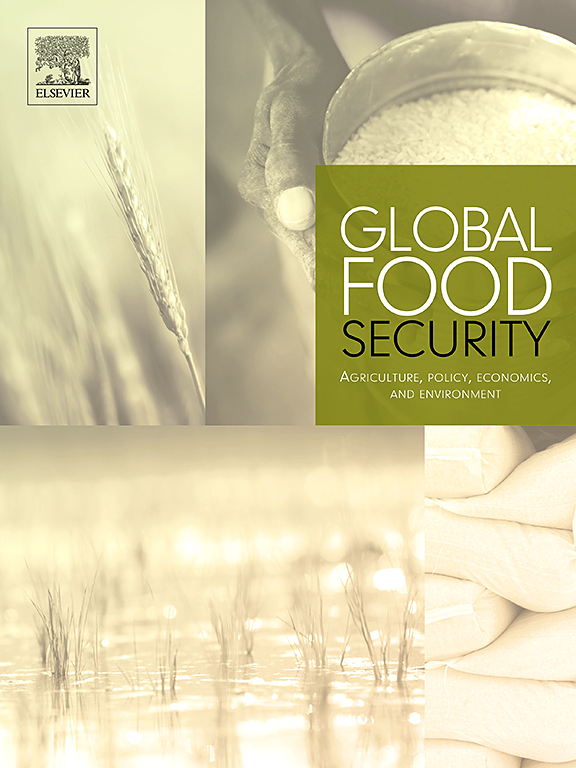Identification, characterization, and determinants of dietary patterns of low-income urban adults in Vietnam and Nigeria
IF 9.6
1区 经济学
Q1 FOOD SCIENCE & TECHNOLOGY
Global Food Security-Agriculture Policy Economics and Environment
Pub Date : 2025-09-01
DOI:10.1016/j.gfs.2024.100797
引用次数: 0
Abstract
Understanding dietary patterns and their determinants can steer efforts to food systems transformations required to provide sustainable healthy diets. Based on 24-h recall data and using latent class analysis, we characterized dietary patterns of adults from low-income neighborhoods in Hanoi, Vietnam and Ibadan, Nigeria (n = 385 and 344, age 18–49 years). We examined sociodemographic determinants and diet quality (diversity, non-communicable disease risk, and micronutrient adequacy) of these patterns. Three dietary patterns were identified in each country. Vietnamese patterns differed in sociodemographic characteristics and diet quality. Nigerian patterns differed in diet quality but not in sociodemographics. Understanding different consumer groups and the drivers of consumption helps to identify tailored interventions to diversify diets and improve diet quality.
越南和尼日利亚低收入城市成年人饮食模式的识别、特征和决定因素
了解饮食模式及其决定因素可以引导粮食系统转型,以提供可持续的健康饮食。基于24小时回忆数据并使用潜在类别分析,我们对来自越南河内和尼日利亚伊巴丹低收入社区的成年人的饮食模式进行了分析(n = 385和344,年龄在18-49岁)。我们检查了这些模式的社会人口统计学决定因素和饮食质量(多样性、非传染性疾病风险和微量营养素充足性)。在每个国家确定了三种饮食模式。越南模式在社会人口特征和饮食质量上有所不同。尼日利亚的模式在饮食质量上有所不同,但在社会人口统计学上没有差异。了解不同的消费者群体和消费驱动因素有助于确定有针对性的干预措施,使饮食多样化,提高饮食质量。
本文章由计算机程序翻译,如有差异,请以英文原文为准。
求助全文
约1分钟内获得全文
求助全文
来源期刊

Global Food Security-Agriculture Policy Economics and Environment
FOOD SCIENCE & TECHNOLOGY-
CiteScore
20.90
自引率
3.40%
发文量
69
期刊介绍:
Global Food Security plays a vital role in addressing food security challenges from local to global levels. To secure food systems, it emphasizes multifaceted actions considering technological, biophysical, institutional, economic, social, and political factors. The goal is to foster food systems that meet nutritional needs, preserve the environment, support livelihoods, tackle climate change, and diminish inequalities. This journal serves as a platform for researchers, policymakers, and practitioners to access and engage with recent, diverse research and perspectives on achieving sustainable food security globally. It aspires to be an internationally recognized resource presenting cutting-edge insights in an accessible manner to a broad audience.
 求助内容:
求助内容: 应助结果提醒方式:
应助结果提醒方式:


